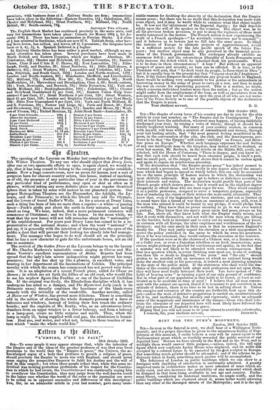ItIttro to tt eititer.
"L'EMPIRE, C'EST LA PAIX!"
19th October 1852.
Sm—To some people it may appear strange that, while the inheritor of the Empire and of the ideas of the greatest .professor of war that ever lived proclaims to the world that the "Empire is peace," the Univers, the ac- knowledged organ of a body that professes to preach a religion of peace, should proclaim the Empire to mean war with England, and should never cease urging the prospective Emperor to fulfil his destiny and the will of God in this respect ; but when these people reflect that, while this same in- dividual was making gratuitous professions of his respect for the Constitu- tion to which he had sworn, the Constitutionnel was continually urging him to overthrow the Constitution, they may judge from the well-known result in the latter case whether the words of the ruler or the journalist are more to be relied on in apparent anomalies and differences of this description ! You, Sir, in an admirable article in your last nUmber, gave many unde- niable reasons for doubting the sincerity of the declaration that the Empire means peace; but there can be no doubt that this declaration was made with some object, and it may be worth while to examine what that object might be. It was not theattaiiament of the Imperial dignity ; for that depends solely upon the will of the speaker on the occasion. The object was as hi all his previous broken promises, to put to sleep the vigilance of those most nearly concerned in the matter. The-French nation is now experiencing the truth of a French apothegm—" La servitude commence par le sommeil " ; and it behoves us to beware lest we fall into the same snare. To blind the nations of Europe to ultimate projects of aggrandizement, would be a sufficient motive for the late pacific speech of the future Em- peror; but another object may be also perceived in the financial neces- sities of the French government. The exchequer already exhibits an enormous deficit ; and the ostentatious liberality of Louis Bonaparte must daily increase the deficit which he inherited from his predecessors. What is to be done in these circumstances ? A loan ? But without an apparent prospect of peace and security, no loan can be effected. It is true as the President well said, that " Le droit vient du peuple, la force vient de Dieu"; but it is equally true in the present day that " r argent vient l'Angleterre." Now, if the future Emperor should entertain any projects hostile to England, there would be nothing very antagonistic to his genius or his antecedents in borrowing money in the name of peace to carry on a war, and then to make the war an excuse for repudiating payment. This is a matter, no doubt, which concerns individual lenders more than the nation ; but as the nation might suffer from the employment of the loan, as well as speculators from its non-payment, it may not be amiss to open the eyes of all who are not mem- bers of the Peace Society as to one of the possible objects of the declaration that the Empire is peace.


























 Previous page
Previous page